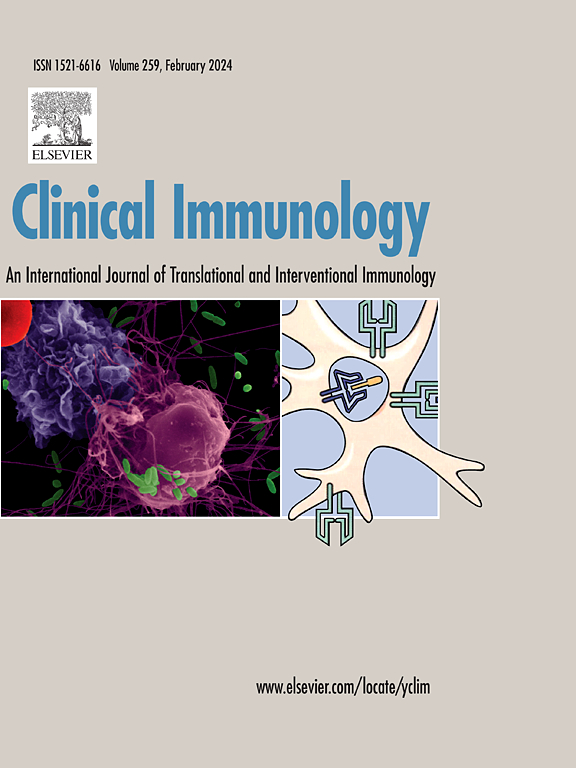抗c1s自身抗体作为狼疮性肾炎的补充血清学生物标志物。
IF 3.8
3区 医学
Q2 IMMUNOLOGY
引用次数: 0
摘要
系统性红斑狼疮(SLE)是一种以循环自身抗体存在为特征的自身免疫性疾病。针对C1复合物蛋白的自身抗体,特别是C1q,已经在狼疮性肾炎(LN)中被描述。然而,针对C1s蛋白酶的自身抗体研究仍然很少。我们确定了SLE患者血清中抗c1s自身抗体的患病率,并评估了它们与临床状况的关系。为此,我们选择了187例不同疾病活动性SLE患者的血清,采用ELISA法检测抗c1s自身抗体。我们观察到LN患者的抗c1s自身抗体水平明显高于其他耀斑类型的SLE患者。抗C1s自身抗体主要识别C1s的n端部分。有趣的是,抗c1s、抗dna和抗c1q自身抗体的组合显示出高特异性(94.6 %)和显著的阳性预测值(80 %)。这些结果表明抗c1s自身抗体在LN早期筛查中作为一种补充的血清学生物标志物具有潜在的价值。本文章由计算机程序翻译,如有差异,请以英文原文为准。
Anti-C1s autoantibodies as complementary serologic biomarker in lupus nephritis
Systemic lupus erythematosus (SLE) is an autoimmune disease characterised by the presence of circulating autoantibodies. Autoantibodies targeting C1 complex proteins, particularly C1q, have already been described in lupus nephritis (LN). However, autoantibodies targeting the C1s protease remain poorly studied. We determined the prevalence of anti-C1s autoantibodies in serum of SLE patients, and evaluated their presence in relation to clinical conditions. For this purpose, sera from 187 SLE patients with different disease activity were selected and anti-C1s autoantibodies were measured by ELISA. We observed that patients with LN had significantly higher levels of anti-C1s autoantibodies than SLE patients with other flare types. Anti-C1s autoantibodies recognised mainly the C1s N-terminal part. Interestingly, the combination of anti-C1s, anti-DNA and anti-C1q autoantibodies showed high specificity (94.6 %) and a significant positive predictive value of 80 %. These results suggest the potential interest of anti-C1s autoantibodies as a complementary serological biomarker in the early screening for LN.
求助全文
通过发布文献求助,成功后即可免费获取论文全文。
去求助
来源期刊

Clinical immunology
医学-免疫学
CiteScore
12.30
自引率
1.20%
发文量
212
审稿时长
34 days
期刊介绍:
Clinical Immunology publishes original research delving into the molecular and cellular foundations of immunological diseases. Additionally, the journal includes reviews covering timely subjects in basic immunology, along with case reports and letters to the editor.
 求助内容:
求助内容: 应助结果提醒方式:
应助结果提醒方式:


